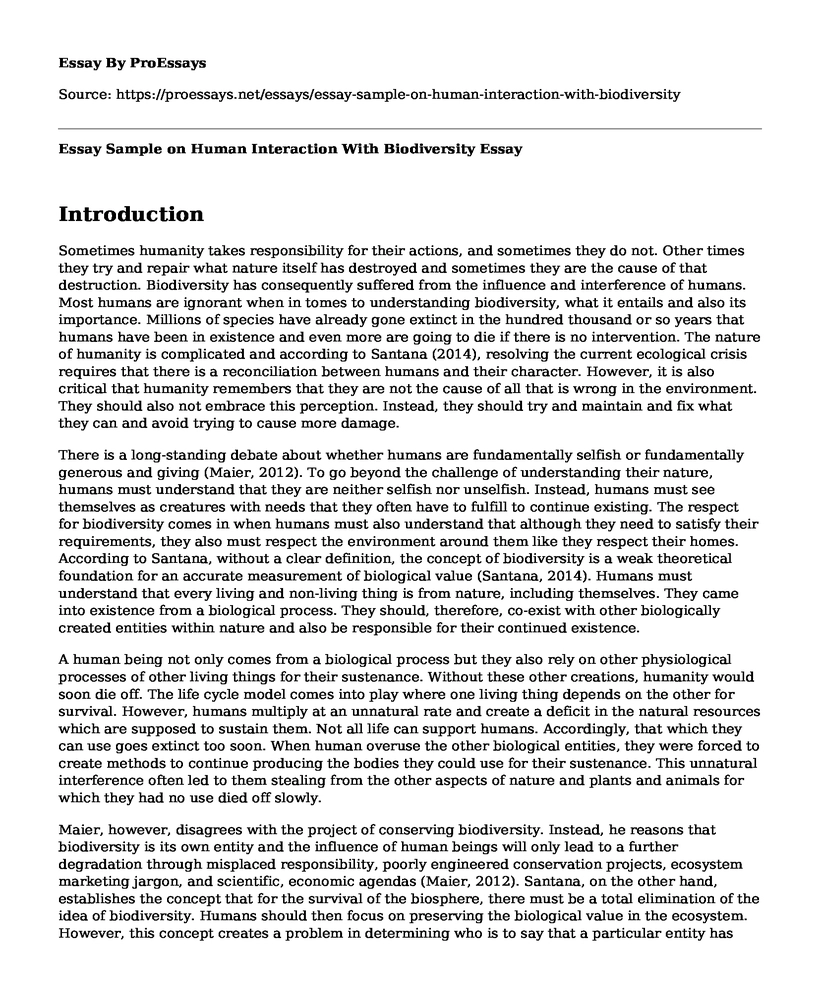Introduction
Sometimes humanity takes responsibility for their actions, and sometimes they do not. Other times they try and repair what nature itself has destroyed and sometimes they are the cause of that destruction. Biodiversity has consequently suffered from the influence and interference of humans. Most humans are ignorant when in tomes to understanding biodiversity, what it entails and also its importance. Millions of species have already gone extinct in the hundred thousand or so years that humans have been in existence and even more are going to die if there is no intervention. The nature of humanity is complicated and according to Santana (2014), resolving the current ecological crisis requires that there is a reconciliation between humans and their character. However, it is also critical that humanity remembers that they are not the cause of all that is wrong in the environment. They should also not embrace this perception. Instead, they should try and maintain and fix what they can and avoid trying to cause more damage.
There is a long-standing debate about whether humans are fundamentally selfish or fundamentally generous and giving (Maier, 2012). To go beyond the challenge of understanding their nature, humans must understand that they are neither selfish nor unselfish. Instead, humans must see themselves as creatures with needs that they often have to fulfill to continue existing. The respect for biodiversity comes in when humans must also understand that although they need to satisfy their requirements, they also must respect the environment around them like they respect their homes. According to Santana, without a clear definition, the concept of biodiversity is a weak theoretical foundation for an accurate measurement of biological value (Santana, 2014). Humans must understand that every living and non-living thing is from nature, including themselves. They came into existence from a biological process. They should, therefore, co-exist with other biologically created entities within nature and also be responsible for their continued existence.
A human being not only comes from a biological process but they also rely on other physiological processes of other living things for their sustenance. Without these other creations, humanity would soon die off. The life cycle model comes into play where one living thing depends on the other for survival. However, humans multiply at an unnatural rate and create a deficit in the natural resources which are supposed to sustain them. Not all life can support humans. Accordingly, that which they can use goes extinct too soon. When human overuse the other biological entities, they were forced to create methods to continue producing the bodies they could use for their sustenance. This unnatural interference often led to them stealing from the other aspects of nature and plants and animals for which they had no use died off slowly.
Maier, however, disagrees with the project of conserving biodiversity. Instead, he reasons that biodiversity is its own entity and the influence of human beings will only lead to a further degradation through misplaced responsibility, poorly engineered conservation projects, ecosystem marketing jargon, and scientific, economic agendas (Maier, 2012). Santana, on the other hand, establishes the concept that for the survival of the biosphere, there must be a total elimination of the idea of biodiversity. Humans should then focus on preserving the biological value in the ecosystem. However, this concept creates a problem in determining who is to say that a particular entity has more biological value than the other. Human beings are still discovering new species, and for those which they already know, they do not comprehend the full impact if they were to be eliminated from the ecosystem.
In the way that human being treats nature, we can see a play in ethics and morality. Ethics and morality teach us that there are consequences for our actions. These consequences are either detrimental or beneficial to use. When a human being acts selfishly, they will only consider what suits them best. For instance, the encroachment of natural forests is an act of selfishness. These humans are only concerned with securing resources they believe are of value to them. However, it is not only in human nature that creatures pursue their needs alone. Even other animals seem to seek what is best for the continuation of their species. Remember that at one point the earth was covered in carbon dioxide until creatures from the oceans which thrived in carbon dioxide and gave off oxygen over-multiplied and led to the now oxygen-rich atmosphere.
Conclusion
To sum up, it would be illogical to believe that humans are solely responsible for the decline in biodiversity and all the extinctions in the world. However, humans are also to blame in the increased reduction in the natural and right state of the ecosystem. Conservation efforts do help, but these are sometimes shrouded in uncertainty and policies which are rarely enforced. It thus begets a conundrum whether humans should actively meddle with biodiversity while trying to fix what they have ruined or whether they should each take care of only their surroundings and hope that everything will play out as it naturally should.
References
Maier, D. S. (2012). What's so good about biodiversity. The International Library of Environmental, Agricultural and Food Ethics, 19.
Santana, C. (2014). Save the planet: eliminate biodiversity. Biology & Philosophy, 29(6), 761-780.
Cite this page
Essay Sample on Human Interaction With Biodiversity. (2022, Dec 13). Retrieved from https://proessays.net/essays/essay-sample-on-human-interaction-with-biodiversity
If you are the original author of this essay and no longer wish to have it published on the ProEssays website, please click below to request its removal:
- The Matrix Between Descartes and Plato Questions and Answers
- Global Journalism Ethics Paper Example
- Analysis According to Catholic Social Teaching Principles: End of Life With Dignity and Respect
- Feminine Identity Essay Example
- In What Ways Is Identity Expressed Through Football Paper Example
- Research Paper on Extinction & Endangered Species: A Human-Catalyzed Catastrophe
- Essay Example on Corporate Social Responsibility: Enhancing Brand Value & Improving Society







